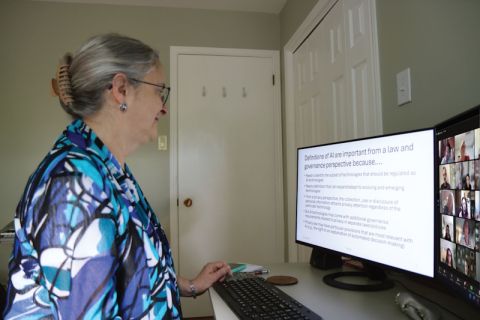

Following the success of its inaugural offering, Queen’s Law is planning more intensive, innovative primers to meet evolving professional needs in rapidly changing fields
Queen’s Law launched its Artificial Intelligence and Law Certificate in May to resounding approval. The virtual, week-long professional development program attracted people from a variety of backgrounds. Thirty participants gained career-enhancing insights into the governance of AI, legal compliance, and global collaboration.
“The overwhelmingly enthusiastic response to our first dip into microcredential programming is very encouraging,” says Dean Colleen M. Flood. “It shows the immense value of providing professionals with practical knowledge and skills in an evolving society and marketplace – and underscores our Faculty’s ability to provide the unrivalled expertise of top legal scholars.”
Leading experts from Queen’s Law – including Flood, Professor Bita Amani, Professor and Conflict Analytics Lab Director Samuel Dahan, and Research and Instruction Librarian Erica Friesen – and from other Ontario law schools, such as Professor Teresa Scassa of University of Ottawa – presented on pressing issues and emerging themes to give participants a deeper look at AI, law, and society.
Erin Spicer-Bowland, Law’12, a sole practitioner and faculty member at Loyalist College in Belleville, Ont., says she was most impressed by the instructors. “They’re actively involved in informing Canada’s legal regulation on data security and the use of AI in the future. Some are even creating the software products that will change the daily practice of law. Their unique insights added incredible value to the learning experience.”
In addition, Spicer-Bowland says: “The content was very engaging, and the delivery made complex topics accessible and interesting.” She and fellow participants learned how to use AI tools for legal research, and explored key concepts related to AI governance and regulation, intellectual property, data privacy, and the risks and opportunities that lie ahead in such areas as health law, administrative law, and human resources management.
Jean-Marc Leclerc, Law’98, a partner at Sotos Class Actions in Toronto, says the program was informative, providing a foundational look at legal and ethical frameworks. “As well, because AI is changing so quickly, we were given practical tools to evaluate benefits and risks that can be applied to future developments and opportunities.”
Learning how to do such critical analysis will give a competitive advantage to participants like Pooja Misra, Law’12, Associate Senior Counsel, Litigation, at Co-operators Group Ltd. in Guelph, Ont. “In-house counsel are frequently approached by companies introducing new AI tools for purchase. This program will allow me to better evaluate such tools for potential adoption within our department, and to avoid pitfalls such as algorithmic bias.”
That’s not the only benefit to Misra. “The AI and Law Certificate program equipped me with practical knowledge that I can immediately apply to make my practice more efficient. I learned, for instance, about several AI-based legal research tools that can streamline tasks such as drafting briefs and legal opinions.”
Queen’s Law designed the certificate program to be accessible for all professional backgrounds and designations, and to be applicable to all sectors. While most participants were legal practitioners, others included a provincial information and privacy commissioner. Learners came from law firms, government, and such industries as financial services, media, engineering, and technology. As part of the program, they got to know each other and collaborate in breakout sessions. “Small group exercises provided excellent opportunities to take AI tools for a spin to compare and contrast how they perform,” says Leclerc. “We learned about the unique and distinct perspectives each attendee brought to the analysis.”
Professionals completing the program receive an AI and Law Certificate from Queen’s Law. For those who practise law in Ontario, there’s a further benefit: the program is eligible for continuing professional development (CPD) credits with the Law Society of Ontario, and exceeds the annual quota for professionalism and equity, diversity, and inclusion (EDI) hours. For his part, Leclerc says of his experience: “I’m very happy I attended to obtain an intensive and valuable primer on AI.”
Future iterations of the AI and Law Certificate – and new offerings now being planned – may be eligible for credits in other jurisdictions, and to a wider range of professions. Interested enrollees are encouraged to consult with their law society or professional accreditor.
More CPD-eligible courses are coming
Flood says while legal AI “was an obvious choice for our initial topic since we have such tremendous in-house expertise in the area, which is transforming the practice of law, legal services delivery, and access to justice,” the Faculty’s scholars have expertise to help professionals bridge theory and practice in other growing and changing fields.
To help plan future courses, she has appointed Professor Josh Karton to an associate deanship and is hiring an assistant dean to oversee the development of professional programs, as well as graduate studies. “We’re exploring various ideas and areas of law where we can equip working professionals with the knowledge and skills they need to stay ahead in their careers,” says Flood. “Stay tuned.”
Gain your competitive advantage
Queen’s Law will be offering the AI and Law Certificate again from December 9 to 13 and expects to announce its 2025 microcredential program offerings early next year. To be among the first to know and register for a spot, sign up for our Continuing Professional Development mailing list at lawprofessionalcertificates@queensu.ca – and also email us your ideas for new program topics of interest.
By Lisa Graham